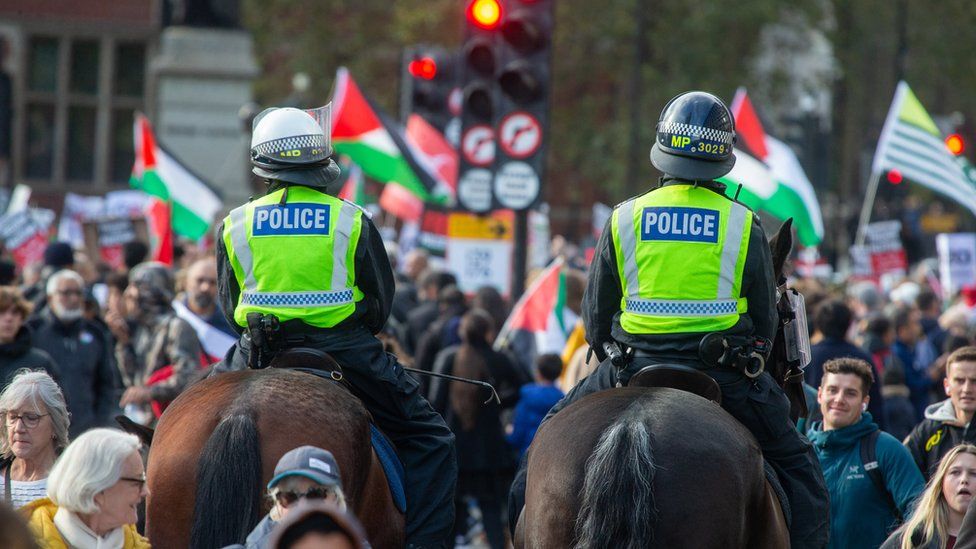ARTICLE AD BOX
 Image source, EPA
Image source, EPA
Met commissioner Sir Mark Rowley said 3,500 community police officers were deployed to London pro-Palestinian protests in October
By Adriana Elgueta & Oliver Slow
BBC News
PM Rishi Sunak has said that planned protests on Armistice Day would be "provocative and disrespectful".
There is a "clear and present" risk war memorials such as the Cenotaph in London could be "desecrated", he added.
It comes as a pro-Palestinian march is planned in London on Saturday 11 November.
Organisers said they had no plans to be near the Cenotaph and understand the sensitivity of the date.
The Met Police said it was planning a "significant" operation and was in contact with organisers, who said they were "willing to avoid the Whitehall area", where the war memorial is located.
Pro-Palestinian protests have been held in London, and other cities globally, each Saturday since the Israel-Gaza war began.
Mr Sunak said on Friday: "To plan protests on Armistice Day is provocative and disrespectful, and there is a clear and present risk that the Cenotaph and other war memorials could be desecrated, something that would be an affront to the British public and the values we stand for."
He added he had asked the Home Secretary Suella Braverman to support the police in "doing everything necessary to protect the sanctity of Armistice Day and Remembrance Sunday".
Ms Braverman said there is an "obvious risk of serious public disorder, violence and damage" if a protest on 11 November goes ahead, describing it as a "hate march through London".
Several events to mark the end of World War One are typically held across the UK on Armistice Day, which is always on 11 November.
This year these include a two-minute silence commemorating the war dead, and the daytime and evening Festival of Remembrance at the Royal Albert Hall in London, with the latter performance usually attended by members of the Royal Family.
On Remembrance Sunday, which this year falls on 12 November, thousands of servicemen and women usually march past the Cenotaph war memorial in central London, where military veterans are joined by senior politicians and members of the Royal Family.
The 11 November protest is expected to call for a ceasefire on the Gaza Strip.
Organisers said they were aware of the importance of the date, and their previous demonstrations had been peaceful and orderly.
Ben Jamal, director of Palestine Solidarity Campaign, said it had "made clear that we have no intention of marching anywhere near Whitehall out of respect for events taking place at the Cenotaph".
He added the march will begin almost two hours after the silence of commemoration for the war dead.
"Each of the protests we have called have been peaceful, orderly, and attended by hundreds of thousands of demonstrators from a diverse cross section of British society," he said, adding that "to suggest that undertaking protests well away from Whitehall is a disrespect for the war dead is an insult to those marching for peace".
Ismail Patel, spokesman for Friends of Al-Aqsa, a pro-Palestinian non-governmental organisation, said: "We definitely will not be at the Cenotaph. We understand the sensitivity of the date."
The Met said a "significant policing and security operation" would be conducted on 11 and 12 November, and that it was "absolutely committed to ensuring the safety and security of anyone attending commemorative events".
"We will use all the powers available to us to ensure anyone intent on disrupting it will not succeed," a spokesperson said.
They added that the police were aware of a "significant demonstration" planned for 11 November, but not Remembrance Sunday, and that organisers were "engaging with our officers and have said they are willing to avoid the Whitehall area, recognising the sensitivities around the date".
More on Israel-Gaza war
Israel has been bombarding Gaza with prolonged air strikes following the 7 October attacks on southern Israel by Hamas, in which they killed 1,400 people and took more than 200 hostage.
The Hamas-run health ministry in Gaza says Israeli air strikes have killed more than 9,000 people.
Protests in London have been largely peaceful, although there have been around 60 arrests at the demonstrations and 100 elsewhere, many related to public order offences and antisemitic and Islamophobic hate crimes.
Mayor of London Sadiq Khan said it was "incredibly important" that demonstrators understood the importance of Remembrance events, telling PA News: "I'd encourage the organisers to work with the police to stay away from the Cenotaph."
It comes as Met commissioner Sir Mark Rowley told the London Assembly that he was "deeply concerned" about the impact on community policing after 3,500 officers were redeployed to central London protests in the past three weeks.

 1 year ago
25
1 year ago
25








 English (US) ·
English (US) ·